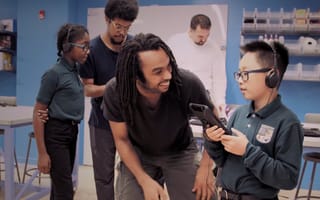
There are about 5,000 statues of prominent historical figures in the United States, more than 700 of which are of Confederate leaders. However, there are only about half as many statues of women and even fewer of Black people.
In fact, in 2017 it was found that, in the U.S. Capitol complex, the heart of the nation’s federal government, there are three times as many statues of Confederate figures as there were Black figures. At the same time, the nation’s Confederate monuments have come under fire amid racial and political unrest. In NYC, the attention has centered around the statue of Christopher Columbus in Columbus Circle, with many advocating for its removal.
One such advocate was Glenn Cantave, a local political activist who has spent years combining his passion for performance art and social justice with technology. He has done everything from run the NYC Marathon in chains to organize an AR pop-up slave auction, all in an effort to educate today’s youth and counter the incomplete narrative of American history that he said he experienced as a child.
“Every kid in America learns about Dr. King and Rosa Parks. But, for me, I didn’t learn about the Black Panthers until I was a freshman in college,” Cantave told Built In. “We learned about Christopher Columbus and his three boats, but we didn’t talk about the slaves at the bottom of those boats.”
This reality is what inspired Cantave and his co-founders Idris Brewster and Micah Milner to create Movers & Shakers, an edtech startup that uses immersive technology like AR to tell the history of marginalized Americans.

Since its 2017 founding, the company has launched Unsung, an app that uses AR to tell the stories of four Black women singers, and the Monuments Project, a mobile app that uses AR to place digital statues of important women, people of color and LGBTQ+ icons in the real world. All the while, it has garnered support from major companies and institutions including Verizon, TED and NYU’s Tisch School of the Arts.
Now, amid the ongoing resurgence of the Black Lives Matter movement, Movers & Shakers is rolling out Kinfolk, an app that helps students take a deeper dive into Black history using AR.
The app houses interactive AR models of various prominent Black figures, accompanied by information about who they were and their contributions to American history. Users can also browse additional resources like books and podcasts, and get access to primary resources like pictures, art and videos.
Kinfolk launched Wednesday with a catalog of six people so far, and is designed for middle school students, according to Cantave.

His co-founder Idris Brewster says the goal is to help Black children see themselves in American history. Before Brewster helped form Movers & Shakers, he was an instructor with Google’s Code Next program, teaching high school students of color in the city about computer science, engineering and immersive technology.
“A lot of the education side of [Movers & Shakers] was inspired by my sessions and moments with those children,” Brewster told Built In. “Throughout that whole time, we were building augmented reality monuments as a way to counteract the narrative of monuments in New York City. We would host teachings and really show people this AR technology and the stories we were trying to tell.”


The hope, says Brewster, is also that these children, particularly children of color, aren’t just inspired by the stories being told, but also the technology being used to tell those stories.
“It’s really expanding a lot of students’ minds and ideas about not only what the future holds, but how they fit into that future. A lot of worry that we have is that Black people and Black communities and narratives and histories are being written out of the future, especially when we look at technology,” Brewster said. “I like how we’re able to kill two birds with one stone here and really go full force in inspiring the youth to not only engage with these histories and technologies, but also hopefully inspire them to build these technologies for themselves.”
Of course, the development of Kinfolk and its preceding apps has not come without some hurdles. For one, AR is still a fairly “experimental” field, as Brewster puts it, which has put some limitations on what the team has been able to accomplish thus far. Plus, there’s the matter of accessibility.
“[Augmented reality] is accessible in terms of immersive media, but it’s not really accessible in terms of all the different kinds of technology. To get it into classrooms and schools, you really have to take into account the technological infrastructure of that school — do they have iPhones, iPads? Do they have Chromebooks?” Brewster explained. “Our target community and the people we’re building this app for are lower-income Black and brown communities, so we need to make sure it’s accessible to them.”
Long term, Cantave says he wants Movers & Shakers’ curriculum to be accessible to every student in America, so that “our kids know the truth.” To accomplish that, the team is now looking to partner with any interested artists, curators, historians and educators to expand its catalog and reach outside of just NYC schools. He sees the launch of the new app as “just the beginning of what we see as a larger movement.”
“A lot of important conversations are finally out in the forefront that are necessary and long overdue,” Cantave said. “Now is definitely the time to handle this so that the next generation doesn’t have to.”




